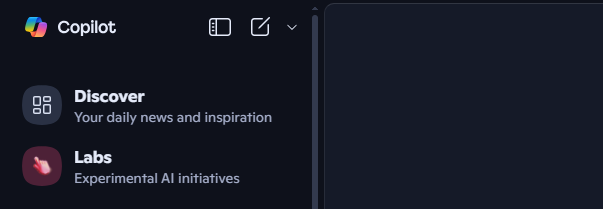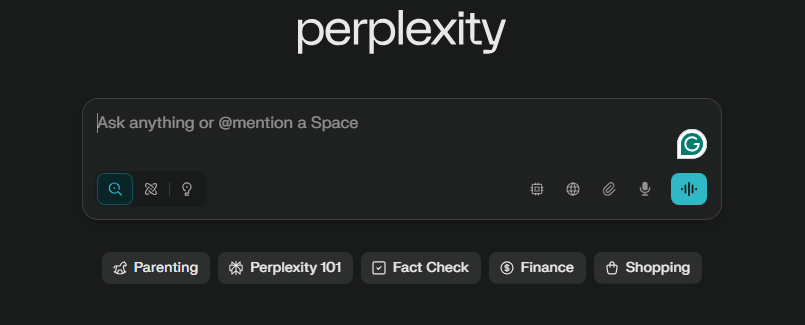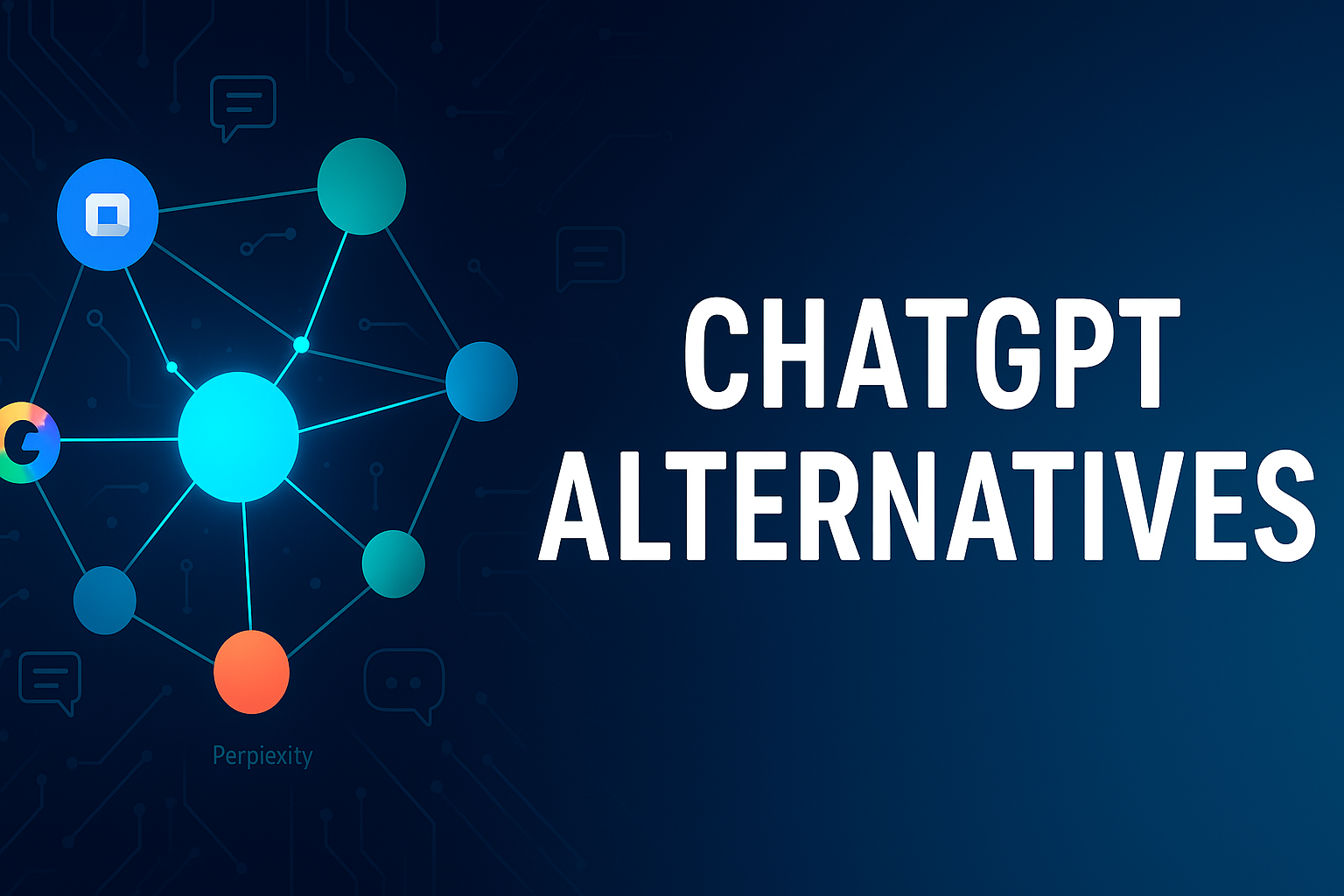Quick Overview: Top ChatGPT Alternatives
- Microsoft Copilot – Enterprise integration and multimodal capabilities
- Google Gemini – Real-time search and Google ecosystem integration
- Claude 3.5 Sonnet – Ethical AI focus with nuanced reasoning
- Perplexity – Citation-backed research with source transparency
- HuggingChat – Open-source customization and privacy control
- ChatSonic – Creative content creation with real-time data
- Poe – Multi-AI platform access in one interface
- Pi – Personal AI companion with voice interaction
- Amazon CodeWhisperer – Developer-focused coding assistance
- Jasper AI – Marketing and brand-consistent content creation
- DataLab – Specialized data science and analytics support
What are ChatGPT alternatives? ChatGPT alternatives are AI-powered conversational tools that offer similar or enhanced capabilities to OpenAI’s ChatGPT, including specialized features for coding, research, content creation, and business applications. These AI assistants provide diverse approaches to artificial intelligence that can better serve specific professional needs and workflows.
Since its explosive debut in late 2022, ChatGPT has fundamentally changed how we interact with artificial intelligence. OpenAI’s groundbreaking conversational AI reached an unprecedented 100 million users in just two months, making it the fastest-growing web application in history. Its ability to understand context and generate remarkably human-like responses has made it an indispensable tool for millions worldwide.
But here’s the thing: ChatGPT is just the tip of the iceberg in today’s AI revolution.
While ChatGPT deserves its reputation as the most prominent generative AI tool, the rapidly evolving landscape of artificial intelligence offers a wealth of alternatives—each with unique strengths, specialized features, and distinct advantages. Whether you’re looking for better search capabilities, enhanced coding assistance, superior creative writing tools, or simply want to explore what else is out there, there’s likely an AI assistant perfectly suited to your specific needs.
In this comprehensive guide, we’ll explore 11 compelling ChatGPT alternatives that are reshaping how we work, create, and solve problems. From tech giants’ flagship AI assistants to innovative startups pushing the boundaries of what’s possible, these AI chatbots and language models offer diverse approaches to artificial intelligence that might just revolutionize your workflow.
Comparison Table: ChatGPT Alternatives at a Glance
| AI Tool | Pricing | Best Use Case | Key Features | Rating |
|---|---|---|---|---|
| Microsoft Copilot | Free/Premium | Enterprise & Research | GPT-4, Multimodal, Office integration | ⭐⭐⭐⭐⭐ |
| Google Gemini | Free/Pro | Real-time research | Live web data, Google integration | ⭐⭐⭐⭐⭐ |
| Claude 3.5 Sonnet | Free/Pro | Writing & Analysis | Ethical AI, nuanced reasoning | ⭐⭐⭐⭐⭐ |
| Perplexity | Free/Pro | Research & Citations | Source attribution, web search | ⭐⭐⭐⭐ |
| HuggingChat | Free | Customization | Open-source, privacy-focused | ⭐⭐⭐⭐ |
| ChatSonic | Limited Free/Paid | Content Creation | Real-time data, avatar customization | ⭐⭐⭐ |
| Poe | Free/Premium | Multi-AI Access | Multiple models, custom bots | ⭐⭐⭐⭐ |
| Pi | Free | Personal Assistant | Voice interaction, mobile-first | ⭐⭐⭐ |
| Amazon CodeWhisperer | Free/Premium | Software Development | Code suggestions, security scanning | ⭐⭐⭐⭐ |
| Jasper AI | Paid ($39+/month) | Marketing Content | Brand voice, 30+ languages | ⭐⭐⭐⭐ |
| DataLab | Varies | Data Science | Analytics, visualization, modeling | ⭐⭐⭐⭐ |
1. Microsoft Copilot: The Enterprise Powerhouse
Microsoft didn’t just invest in OpenAI—they transformed that partnership into something remarkable. Microsoft Copilot, previously known as Bing Chat, represents Microsoft’s vision of AI integration at its finest.
What sets it apart: Powered by GPT-4, Copilot goes beyond simple text generation by embracing true multimodality. This means you can receive responses that seamlessly blend text and images, making it incredibly versatile for research, presentations, and creative projects.
Best for: Business users, researchers, and anyone who needs AI assistance integrated across Microsoft’s ecosystem of products.
Key Features:
- GPT-4 powered responses
- Multimodal text and image generation
- Deep Microsoft 365 integration
- Real-time web search capabilities
- Enterprise-grade security
The real magic happens when Copilot works within Microsoft 365 applications, turning your everyday tools into AI-powered productivity machines.

2. Google Gemini: The Search Giant’s Answer
Google’s response to the ChatGPT phenomenon comes in the form of Gemini (formerly Google Bard), a sophisticated AI system that leverages Google’s decades of search expertise and vast data resources.
What makes it special: Gemini doesn’t just generate responses—it accesses real-time information from the web, ensuring your answers are current and factually grounded. Its integration with Google’s ecosystem means seamless access to Google Search, Maps, YouTube, and other services.
Perfect for: Users who prioritize up-to-date information, Google Workspace users, and those who want AI assistance that connects to real-world data.
Key Features:
- Real-time web information access
- Google Workspace integration
- Multimodal capabilities
- Live data from Google services
- Advanced reasoning abilities
Google’s commitment to multimodal capabilities means Gemini can handle both text and images with impressive sophistication, making it a versatile tool for various professional and creative applications. Learn more about Google’s AI ecosystem integration.

3. Claude 3.5 Sonnet: The Ethical AI Pioneer
Developed by Anthropic, Claude 3.5 Sonnet represents a thoughtful approach to AI development that prioritizes safety, nuanced reasoning, and ethical considerations without sacrificing performance.
What distinguishes it: Claude excels at handling complex, nuanced conversations that require careful reasoning and context awareness. Its focus on safety means you can trust it with sensitive topics, while its sophisticated understanding makes it ideal for professional writing, analysis, and creative projects.
Ideal for: Writers, researchers, professionals dealing with sensitive content, and users who value AI safety and ethical considerations.
Key Features:
- Advanced reasoning capabilities
- Ethical AI framework
- Long-form content generation
- Context-aware responses
- Safety-focused design
The availability of Claude through its API makes it an excellent choice for developers looking to integrate sophisticated AI capabilities into their applications. For more insights on ethical AI development, explore our responsible AI implementation guide.

4. Perplexity: The Citation Champion
Perplexity AI addresses one of the biggest challenges with AI-generated content: transparency and source attribution. This innovative platform functions as both a conversational AI and a research assistant.
Why it stands out: Every response includes proper citations, allowing you to verify information and dive deeper into sources. The minimalist interface makes it incredibly user-friendly, and you don’t even need an account to start using it.
Great for: Researchers, students, journalists, and anyone who needs reliable, source-backed information for their work.
Key Features:
- Automatic source citation
- Real-time web search
- Claude 3 Haiku powered free tier
- GPT-4 powered Pro version
- Copilot interactive search assistant
The Pro version, powered by GPT-4, includes Copilot—an interactive feature that asks clarifying questions to ensure you get exactly the information you need.

5. HuggingChat: The Open-Source Champion
For those who value transparency, customization, and community-driven development, HuggingChat offers a compelling open-source alternative that puts control back in users’ hands.
Key advantages:
- Complete transparency: Full access to code and model architecture
- Customizable: Fine-tune the AI for specific use cases or industries
- Privacy-focused: Self-hosting options and no vendor lock-in
- Community-driven: Continuous improvements from an active developer community
Perfect for: Developers, researchers, organizations with specific privacy requirements, and anyone who prefers open-source solutions.
Technical Features:
- Built on LLaMA-based models
- API integration capabilities
- Custom dataset training
- Self-hosting options
- Privacy-first architecture
While it may not match the fine-tuned capabilities of proprietary solutions in every scenario, HuggingChat’s flexibility and transparency make it invaluable for specialized applications.
6. ChatSonic: The Creative Content Creator
Positioning itself as ChatGPT for content creators, ChatSonic combines GPT-4 power with Google Search integration to deliver up-to-date, creative responses.
Standout features:
- Real-time information through Google Search integration
- Multimodal capabilities for diverse content creation
- Avatar-based customization for personalized interactions
- Strong focus on creative and marketing content
Best suited for: Content creators, marketers, social media managers, and creative professionals.
Content Creation Features:
- Brand voice customization
- Multiple content formats
- Social media optimization
- Creative writing assistance
- Marketing copy generation
Keep in mind that the interface can feel complex compared to simpler alternatives, and the free tier is quite limited at 10,000 words per month.

7. Poe: The Multi-AI Command Center
Imagine having access to ChatGPT, Claude, GPT-4, and other leading AI models all in one place. That’s exactly what Poe delivers, creating a unified platform for AI interaction.
What makes it unique: Developed by Quora, Poe lets you seamlessly switch between different AI models, compare responses, and even create custom chatbots with personalized prompts.
Ideal for: Power users who want to leverage multiple AI models, developers experimenting with different approaches, and users who like to compare AI responses.
Platform Features:
- Access to GPT-3.5, GPT-4, Claude+, LlaMA 2, PaLM
- Custom chatbot creation
- Model comparison capabilities
- Fast response times
- Cross-platform availability
The ability to send the same prompt to different AI models and compare results makes Poe invaluable for research, testing, and finding the best AI for specific tasks.

8. Pi: The Personal AI Companion
Inflection AI’s Pi (Personal Intelligence) takes a refreshingly different approach, focusing on personal connection and smartphone-first design.
Distinctive qualities:
- Available across popular platforms (WhatsApp, Facebook, Instagram)
- Voice interaction capabilities with natural-sounding voices
- Designed for personal, supportive conversations
- Mobile-optimized experience
Great for: Mobile users, those seeking personal AI assistance, and users who prefer voice interactions over text.
Personal Features:
- Conversational voice interface
- Emotional intelligence
- Personal interest adaptation
- Cross-platform messaging
- iOS app availability
Currently, Pi is limited to Apple devices and has some knowledge limitations, but its innovative approach to personal AI assistance makes it worth watching.

9. Amazon CodeWhisperer: The Developer’s Assistant
Amazon’s entry into AI-powered coding assistance offers a compelling alternative to GitHub Copilot, particularly for developers working within the Amazon ecosystem.
Key strengths:
- Excellent integration with Amazon Web Services
- Strong performance with Python, Java, and JavaScript
- Source citations for generated code suggestions
- Free tier available for individual developers
- Built-in security scanning and recommendations
Perfect for: AWS developers, Python/Java/JavaScript programmers, and developers who prioritize security and attribution.
Developer Features:
- Real-time code suggestions
- Security vulnerability detection
- Code optimization recommendations
- IDE integration (VS Code, PyCharm, JupyterLab)
- Source code attribution
While it supports fewer programming languages than some competitors, its deep integration with Amazon services and focus on security make it valuable for enterprise development.
10. Jasper AI: The Marketing Maven
Built specifically for marketing and content creation, Jasper AI combines multiple leading language models to deliver brand-consistent, high-quality content.
What sets it apart:
- Trained on 30+ languages for global marketing campaigns
- 50+ specialized templates for different content types
- Brand voice learning and consistency
- Integration with popular marketing tools
Ideal for: Marketing teams, SEO specialists, content agencies, and businesses focused on brand consistency.
Marketing Features:
- Brand voice replication
- SEO-optimized content
- Social media content creation
- Email marketing templates
- Multi-language support
The lack of a free tier and starting price of $39/month makes it a serious investment, but the specialized features and brand focus can justify the cost for marketing professionals.
11. DataLab: The Data Science Specialist
DataLab represents the growing category of specialized AI tools designed for specific professional domains like data science and analytics.
Focus areas: Data analysis, visualization, statistical modeling, and research applications.
Best for: Data scientists, researchers, and analysts who need AI assistance with technical, data-driven tasks.
Specialized Features:
- Statistical analysis assistance
- Data visualization recommendations
- Research methodology guidance
- Code generation for analysis
- Scientific writing support
Frequently Asked Questions
What is the best free ChatGPT alternative?
HuggingChat and Perplexity offer excellent free tiers without requiring account creation. HuggingChat provides open-source flexibility and privacy control, while Perplexity excels at research with proper source citations. Google Gemini also offers a robust free tier with real-time web access.
Which ChatGPT alternative is best for coding?
Amazon CodeWhisperer provides specialized coding assistance with security scanning, source attribution, and excellent AWS integration. It’s particularly strong for Python, Java, and JavaScript development. The free tier makes it accessible for individual developers.
Are ChatGPT alternatives really better than ChatGPT?
It depends on your specific needs. While ChatGPT excels at general conversation and creative tasks, alternatives often provide specialized features:
- Better for research: Perplexity (citations), Google Gemini (real-time data)
- Better for business: Microsoft Copilot (enterprise integration)
- Better for privacy: HuggingChat (open-source)
- Better for coding: Amazon CodeWhisperer (security focus)
Can I use multiple AI assistants together?
Absolutely! Poe specifically enables this by providing access to multiple AI models in one platform. Many professionals use different AI tools for different tasks—ChatGPT for general queries, Perplexity for research, and specialized tools like Jasper for marketing content.
Which AI alternative has the most up-to-date information?
Google Gemini and Perplexity both access real-time web information, making them excellent for current events and recent developments. ChatSonic also integrates Google Search for up-to-date responses.
Are there privacy-focused ChatGPT alternatives?
HuggingChat leads in privacy with open-source architecture and self-hosting options. Claude 3.5 Sonnet also emphasizes ethical AI and data privacy. These options give you more control over your data compared to traditional cloud-based AI services.
Making the Right Choice: Your AI Assistant Selection Guide
With so many options available, choosing the right ChatGPT alternative depends on your specific needs, budget, and workflow requirements. Here’s how to think about your decision:
For Business and Enterprise Users
Consider Microsoft Copilot for seamless integration with existing Microsoft tools, or Google Gemini for real-time information and Google Workspace integration. Both offer enterprise-grade security and scalability.
For Researchers and Students
Perplexity excels with its citation features and source transparency, while Claude 3.5 Sonnet offers sophisticated reasoning for complex topics. Google Gemini provides real-time access to current information and research data.
For Developers and Programmers
Amazon CodeWhisperer provides excellent coding assistance with security focus and AWS integration, while HuggingChat offers maximum customization and transparency for specialized development needs.
For Content Creators and Marketers
Jasper AI delivers professional marketing content with brand consistency, while ChatSonic offers creative flexibility with real-time information. Both support multiple content formats and marketing workflows.
For Experimenters and Power Users
Poe provides access to multiple AI models in one platform, perfect for comparing capabilities and finding the best tool for each task. This approach maximizes your AI toolkit potential.
For Privacy-Conscious Users
HuggingChat leads with open-source transparency and self-hosting options, while Claude 3.5 Sonnet emphasizes ethical AI development and responsible data handling.
The Future of AI Assistance and Generative AI Tools
The AI landscape continues evolving at breakneck speed, with new tools and capabilities emerging regularly. While ChatGPT pioneered the conversational AI revolution, these alternatives prove that innovation in artificial intelligence is far from slowing down.
Each tool we’ve explored offers something unique—whether it’s better integration with existing workflows, specialized capabilities for specific professions, enhanced privacy and transparency, or simply a different approach to human-AI interaction. The rise of specialized AI assistants shows the market moving toward more targeted, industry-specific solutions.
Key trends shaping the future:
- Specialization: AI tools becoming more focused on specific professional domains
- Integration: Deeper connections with existing business software and workflows
- Multimodality: Enhanced capabilities combining text, images, voice, and video
- Privacy: Increased focus on data protection and user control
- Real-time data: Better access to current information and live web data
The key is understanding that there’s no single “best” AI assistant. The most effective approach often involves using different tools for different purposes, building a toolkit of AI assistants that complement each other and enhance your productivity across various tasks.
As we move forward, the competition between these platforms will likely drive even more innovation, better features, and more specialized tools. For users, this means more choice, better performance, and AI assistants that are increasingly tailored to specific needs and preferences.
Conclusion: Your Next Steps in the AI Revolution
The AI revolution is just getting started, and these ChatGPT alternatives are proof that the future of artificial intelligence is diverse, exciting, and full of possibilities. Whether you stick with ChatGPT or explore these alternatives, the important thing is finding the AI tools that best serve your goals and enhance your productivity.
Action steps to get started:
- Identify your primary use case (research, coding, content creation, etc.)
- Try the free tiers of 2-3 alternatives that match your needs
- Compare results for your specific tasks and workflows
- Consider premium features if free tiers meet basic requirements
- Build your AI toolkit with complementary tools for different purposes
The landscape of AI assistants and conversational AI continues to expand, offering unprecedented opportunities for productivity enhancement and creative problem-solving. By understanding the strengths of each alternative, you can make informed decisions about which AI tools will best serve your personal and professional objectives.



